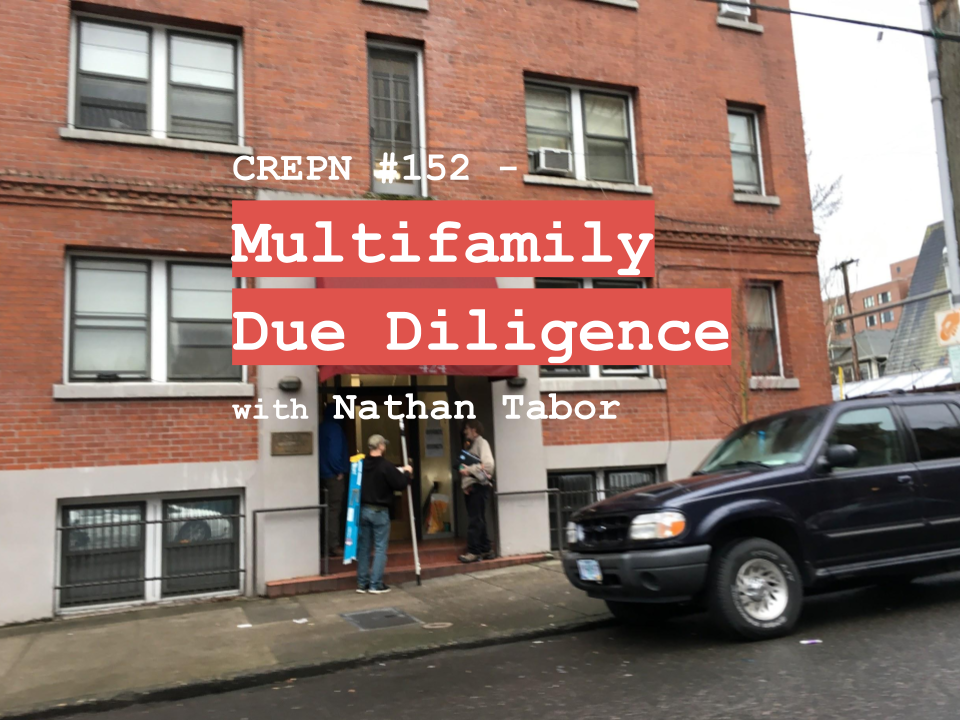12 Jul CREPN #152 – Multifamily Due Diligence with Nathan Tabor
Multifamily due diligence can be a black hole for real estate investors.
[x_audio_embed][/x_audio_embed]
Nathan Tabor has learned expensive lessons from flipping multifamily properties. He shares some lessons and what you can do during due diligence to avoid learning the hard way.
Remember, the object is to learn all you can before you close so that you have no surprises. Here is a short list that every real estate investor can use.
Local Knowledge
Before you spend any money on physical inspections, contact the local authorities. When possible, go to the building permit authority in person and confirm that the property is zoned for the current usage, and future usage if you have construction plans.
Find the local Housing Authority. It may be the city or county, but usually there is an advocate for tenants to complain to. Look for complaints against the property. Google the property to see what comes up. If the property is not well taken care of, tenants will likely complain. Find out if any complaints have been filed before you close. They will be your responsibility after the property is yours.
Look for the eviction court record. How many evictions have been filed against the tenants at the property. If there are a lot of evictions, you have a very unstable property.
Crime records; how many times have the police been called to the property and for what. You can renovate a property, but it is really hard to renovate a neighborhood.
If the above issues check out, it’s time to move to the physical property due diligence.
The Physical Property
Older properties can be an endless opportunity for unplanned cost. Some things Nathan has learned to check for.
Know the entire Electrical system. Check every plug to make certain there is power. Ask questions about the wiring. Is there any aluminum wiring? Are there fuses or circuit breakers. If circuit breakers, what brand of electrical box? All of these can significantly affect the insurance you will be able to get for the property and the cost.
Trip and fall hazards. Inspect the parking lot, walkways and stairs for cracks and uneven surfaces. If there are issues, you need to identify them now and the cost to fix. If you don’t and the insurance company inspection is unfavorable, you could lose your insurance.
The plumbing system. Sit on every toilet to see if the sub flooring is solid. Scope all of the waste lines for any blockage or failures. Turn on the water in multiple fixtures at the same time and see what happens. Is there a fire hydrant on the property, if so is it yours or the city’s? Find out the answers and get estimates for needed repairs.
Due Diligence Numbers Don’t Lie
If you pay to much, you can lose you can mess up your future opportunities to invest in real estate. Your offer price cannot be more than the property can support. A good way to avoid paying too much is to back into your offer price. How much you want to make? What are the estimated repair cost, carrying cost, etc? Add all of these together and you will know the maximum amount you can offer. Leave no stone unturned.
When you get your loan offer, be sure to read the requirements for insurance. If the loan allows for a maximum deductible of $5,000 and your insurance quote has a $25,000 deductible, it will cost you to buy the lower deductible.
Verify the Sellers numbers. Verify the Rent Roll with the bank statements to see if the rent deposits match the rent roll. You can also ask for tax returns. The seller may inflate the rent roll, but will likely not inflate rent collected on his taxes.
For more go to: nathantabor.com
[author title=”About the Author”]]]>


